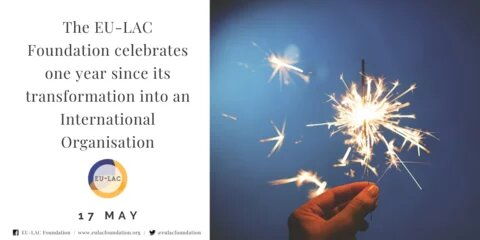The European Union-Latin America and the Caribbean Foundation (EU-LAC Foundation) celebrates on 17 May a year since its historic transformation into an international organisation.
On 17th May 2019 the Agreement establishing the International EU-LAC Foundation came into force. The Foundation was created in 2010 by all the member countries of the European Union, the EU itself and the countries of Latin America and the Caribbean and began to operate under a transitional Foundation status from 2011.
Its status as an international organisation allows the Foundation to more significantly fulfil its objective of fostering civil society participation, improving visibility and mutual understanding and promoting the development of a joint and dynamic global vision in both regions (bit.ly/2xWXkOD), being the only international organisation that brings together all and exclusively the members of the EU and Latin America and the Caribbean.
Throughout this first year, amongst other activities, the Foundation has organised two editions of its so-called Reflection Forums, spaces for encounter and debate between senior government officials, academics, and representatives of civil society (bit.ly/3cuMK0i).
Also, as part of its mission to contribute to the exchange of knowledge, it has continued with its programme of publishing studies on topics relevant to both sides of the Atlantic (bit.ly/2Ashzox), also complemented by a periodic newsletter of an informative nature (bit.ly/2AjFRAJ).
In the face of the ongoing pandemic, the Foundation has launched a series of online seminars to further promote dialogue and exchange of experiences. The next webinars are announced on its website and social networks.
The EU-LAC Foundation will continue to work to encourage and make visible exchanges and initiatives in areas such as higher education and science, sustainable development, climate change, culture, and to promote in its work the common values between both regions: democracy, respect for human rights and fundamental freedoms, and a model of sustainable and inclusive societies.
